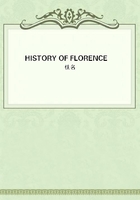
第165章
Lorenzo, flushed with youth and power, would assume the direction of everything, and resolved that all transactions should bear an impress of his influence. The Pazzi, with their nobility and wealth unable to endure so many affronts, began to devise some means of vengeance. The first who spoke of any attempt against the Medici, was Francesco, who, being more sensitive and resolute than the others, determined either to obtain what was withheld from him, or lose what he still possessed.
As the government of Florence gave him great offense, he resided almost constantly at Rome, where, like other Florentine merchants, he conducted extensive commercial operations; and being a most intimate friend of Count Girolamo, they frequently complained to each other of the conduct of the Medici. After a while they began to think that for the count to retain his estates, or the Pazzi their rights in the city, it would be necessary to change the government of Florence; and this they considered could not be done without the death of Giuliano and Lorenzo. They imagined the pope and the king would be easily induced to consent, because each could be convinced of the facility of the enterprise. Having acquired these ideas, they communicated them to Francesco Salviati, archbishop of Pisa, who, being ambitious and recently offended by the Medici, willingly adopted their views.
Considering their next step, they resolved, in order to facilitate the design, to obtain the consent of Jacopo de' Pazzi, without whose concurrence they feared it would be impracticable. With this view, it was resolved that Francesco de' Pazzi should go to Florence, while the archbishop and the count were to remain at Rome, to be ready to communicate with the pope when a suitable opportunity occurred.
Francesco found Jacopo de' Pazzi more cautious and difficult to persuade than he could have wished, and on imparting this to his friends at Rome, it was thought he desired the sanction of some greater authority to induce him to adopt their views. Upon this, the archbishop and the count communicated the whole affair to Giovanni Batista da Montesecco, a leader of the papal forces, possessing military reputation, and under obligations to the pope and the count.
To him the affair seemed difficult and dangerous, while the archbishop endeavored to obviate his objections by showing how much assistance the pope and the king would lend to the enterprise; the hatred of the Florentines toward the Medici, the numerous friends the Salviati and the Pazzi would bring with them, the readiness with which the young men might be slain, on account of their going about the city unaccompanied and without suspicion, and the facility with which the government might then be changed. These things Giovanni Batista did not in reality believe, for he had heard from many Florentines quite contrary statements.
While occupied with these deliberations, Carlo, lord of Faenza, was taken ill, and tears were entertained for his life. This circumstance seemed to the archbishop and the count to offer an opportunity for sending Giovanni Batista to Florence, and thence to Romagna, under pretence of recovering certain territories belonging to the latter, of which the lord of Faenza had taken possession. The count therefore commissioned Giovanni Batista to have an interview with Lorenzo de'
Medici, and on his part request his advice how to proceed with respect to the affair of Romagna; that he should then see Francesco de' Pazzi, and in conjunction with him endeavor to induce his uncle Jacopo to adopt their ideas. To render the pope's authority available in their behalf, Giovanni Batista was ordered, before his departure, to communicate with the pontiff, who offered every means at his disposal in favor of their enterprise. Giovanni Batista, having arrived at Florence, obtained an interview with Lorenzo, by whom he was most graciously received; and with regard to the advice he was commissioned to ask, obtained a wise and friendly answer; so that he was astonished at finding him quite a different character from what he had been represented, and considered him to possess great sagacity, an affectionate heart, and most amicably disposed toward the count. He found Francesco de' Pazzi had gone to Lucca, and spoke to Jacopo, who was at first quite opposed to their design, but before they parted the pope's authority seemed to have influenced him; for he told Giovanni Batista, that he might go to Romagna, and that before his return Francesco would be with him, and they would then consult more particularly upon the subject. Giovanni Batista proceeded to Romagna, and soon returned to Florence. After a pretended consultation with Lorenzo, upon the count's affairs, he obtained an interview with Francesco and Jacopo de' Pazzi, when the latter gave his consent to their enterprise. They then discussed the means of carrying it into effect. Jacopo de' Pazzi was of opinion that it could not be effected while both the brothers remained at Florence; and therefore it would be better to wait till Lorenzo went to Rome, whither it was reported he had an intention of going; for then their object would be more easily attained. Francesco de' Pazzi had no objection to Lorenzo being at Rome, but if he were to forego the journey, he thought that both the brothers might be slain, either at a marriage, or at a play, or in a church. With regard to foreign assistance, he supposed the pope might assemble forces for the conquest of the fortress of Montone, being justified in taking it from Count Carlo, who had caused the tumults already spoken of in Sienna and Perugia.